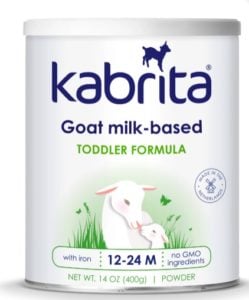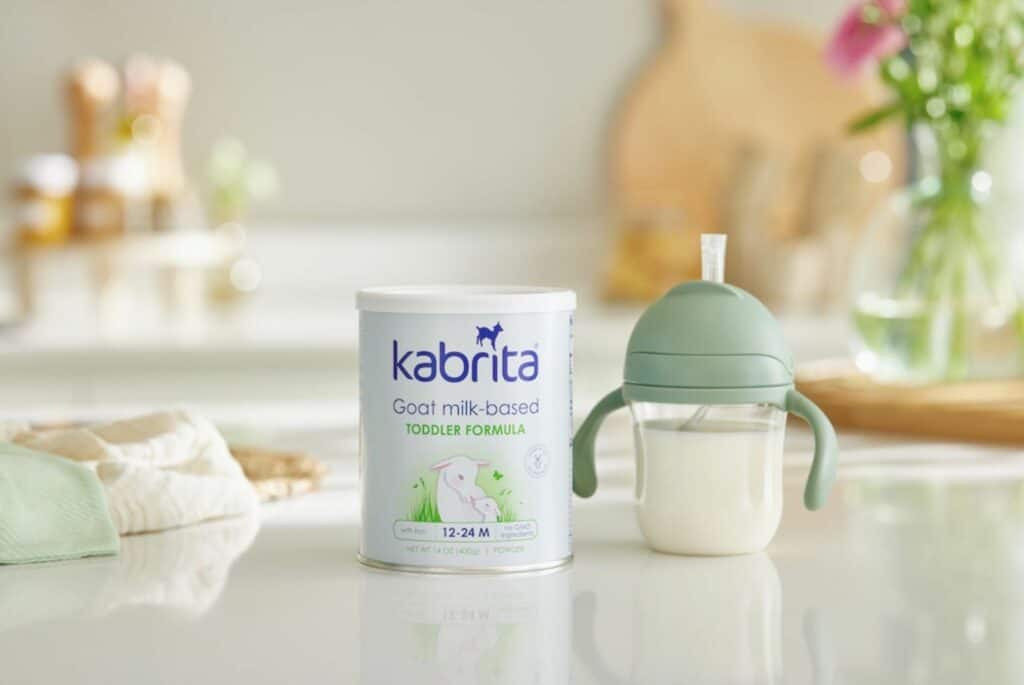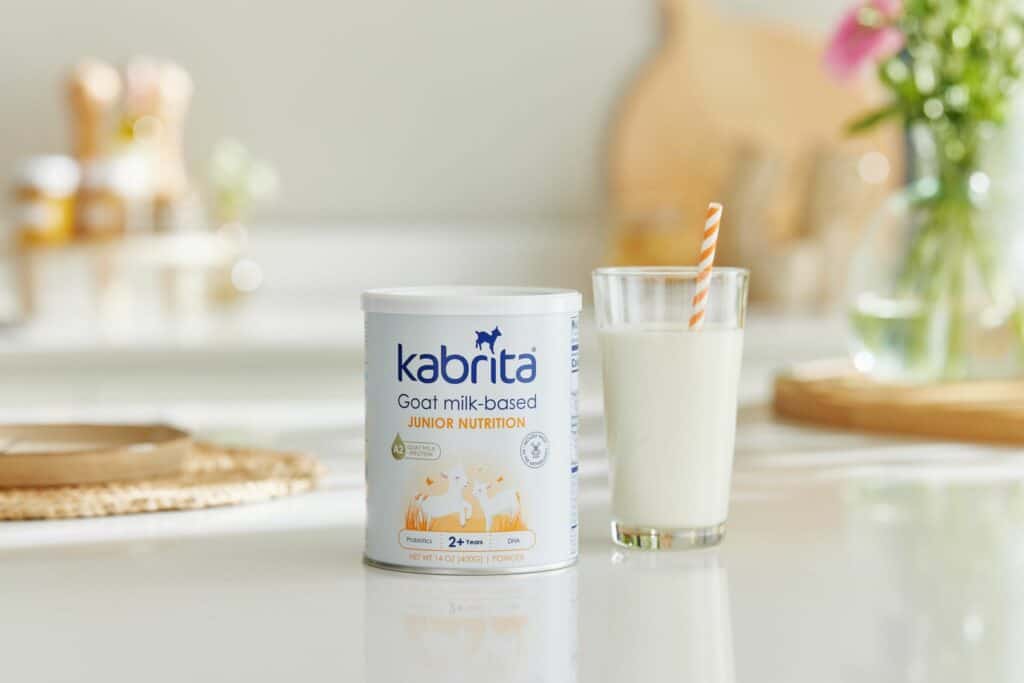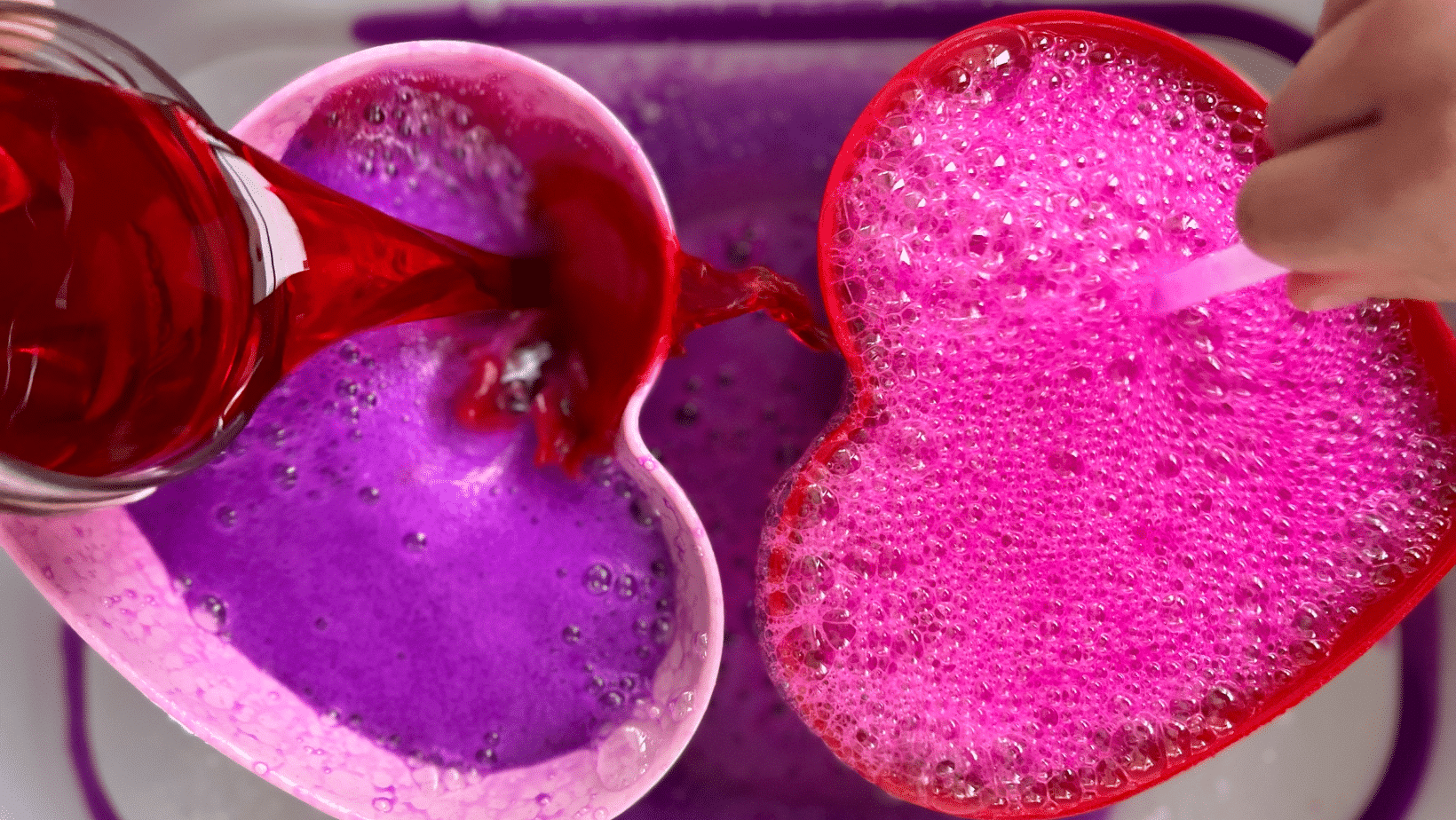
This post may contain affiliate links. As an Amazon Associate, I earn from qualifying purchases. Please read my disclosure.
If you’re a parent searching for the best baby formula for your little one, you might have come across goat milk baby formula. But you might be wondering: what are the benefits of goat milk formula? Is it just as good, or better, than cow’s milk formula? And how does it compare to breastmilk? In this comprehensive guide, we’ll break down the unique properties of goat milk formula, its role in infant nutrition, and the potential benefits and considerations for parents looking to provide the best nourishment for their little ones.
There are so many formula options on the market today, but goats milk formula for babies has recently emerged as a popular alternative to cow milk-based options. Part of the reason why goat milk formula has gotten more attention is because of the unique benefits of goat milk for babies.
Join us as we explore the science behind goat milk baby formula, demystify common misconceptions, and shed light on why this natural choice caters to the specific needs of parents seeking gentle, nutritious, and easily digestible options for their infants.
What Is Goat Milk Formula?
Goat milk formula is a type of infant formula that uses goat milk as its primary protein source instead of cow milk, which is the more common protein source in the majority of baby formulas.
Goat milk baby formula is fortified to meet the nutritional requirements of infants and toddlers during their early stages of growth and development. It’s often a great choice for babies and parents because it has a different natural composition compared to cow’s milk, including smaller fat globules, a slightly different protein structure, and a distinct mineral and vitamin profile. These factors contribute to its potential benefits, such as easier digestibility and a reduced likelihood of triggering allergies or sensitivities.
Goat formula typically comes in a few different stages to cater to different age ranges. While every formula is different, usually Stage 1 will be for 0-6 months, Stage 2 from 6-12 months, and Stage 3 from 12-24 months.
Goat Milk Nutrition Facts
Goat milk nutrition is the basis for goat milk infant formula. One 8oz serving (1 cup) of whole goat milk contains: ~170 calories, 9 grams of protein, 10 grams of fat, 11 grams of carbohydrate, and is high in calcium, phosphorous, potassium, and Vitamin A.
In comparison, one 8 ounce serving of whole cow’s milk contains: 150 calories, 8 grams of fat, 8 grams of protein, 12 grams of carbs, and is also and is high in calcium, phosphorous, potassium, and Vitamin A. Cow’s milk will also contain Vitamin D when it’s fortified.
Also Read : 9 Ways to Practice Yoga with a Beginner’s Mind
Keep in mind that when regular goat or cow milk is turned into baby formula, it’s modified significantly and fortified to resemble breast milk and meet the nutritional requirements for infants and babies.
Shop Kabrita Goat Milk Formula

- Non GMO, made in Europe, no antibiotics, hormones and pesticides.
- Added prebiotics, and a whey-to-casein ratio that closely resembles that in breast milk. Easy to digest!
- No glucose syrup solids, no maltodextrin, no taurine or l-carnitine.
- A toddler formula, that also meets the FDA nutritional requirements for infant formula.
- Easy to try with FREE full size can of formula!
Is Goat Milk Formula Better Than Cow’s Milk Formula?
While there are significant differences between goat milk and cow milk formula, whether goats milk for babies is better than cow’s milk formula depends on your baby’s individual nutrition needs.
If your baby is sensitive to cow’s milk, and does better on a formula that has less lactose, smaller fat molecules, and the easier to digest A2 protein structure, then goat milk formula could be better than cow’s milk for your baby. Learn more: Goat Milk Formula vs. Cow Milk Formula.
What Are The Advantages Of Goat Milk Vs. Cow Milk?
There are three main advantages of goat milk vs. cow milk:
- Less lactose: Lactose is the primary carbohydrate in both goat and cow milk. But goat milk has less lactose, which can be easier for babies to digest.
- Different fat structure: Goat milk has more medium-chain fatty acids, which can be easier to digest and are more quickly absorbed by the body. Cow’s milk has more long-chain fatty acids, which can be harder on baby’s digestion.
- Different protein structure: Milk is made up of two types of protein – whey and casein. While whey protein is mostly similar in both cow and goat milk, the casein protein is different. Goat milk is naturally made up of A2 casein protein, whereas cow’s milk is naturally made up of A1 casein protein. You can find A2 cow’s milk but it’s rare and expensive, because only a small number of cows in the world produce A2 milk. A2 casein protein is easier to digest than A1.
For these reasons, goat milk may be more suitable for children with CMS (cow’s milk sensitivity). For some children, drinking cow milk formula can result in digestive issues, constipation, diarrhea, gas, bloating, congestion, eczema and more. These mild to moderate symptoms are associated with CMS, which affects 30-50% of children.
Note: goat milk will not work for babies with a diagnosed cow milk protein allergy (CMPA), which affects only about 2-3% of children under the age of six.
Which Is Better: Goat Milk Vs. Breast Milk?
Both goat milk and human breast milk are beneficial for different reasons and circumstances.
Goat milk formula is a good alternative to breast milk, for any parents who either can’t breastfeed at all, or need to supplement, or want to wean their babies from breastfeeding.
Breastmilk is hugely beneficial to babies, as it provides a perfectly balanced blend of nutrients, immune-boosting antibodies, and other essential compounds for a baby’s growth and development. But the good news is that goat milk formula can get pretty close to breastmilk and is a great option for babies! Here is how goat milk compares to breastmilk along a few key factors:
- Tailored nutrition: Breast milk composition changes as your baby grows, and goat milk formula is created in stages to match your baby’s developmental needs.
- Immunity: Breast milk contains antibodies and other immune-boosting substances that help protect infants against infections and illnesses. Goat milk formula contains prebiotics and has naturally occurring immunoglobulins to help boost immunity.
- Digestibility: Breast milk is easy for infants to digest due to its unique composition, including enzymes that aid in the digestion and absorption of nutrients. Goat milk formula is also easy to digest due to its reduced lactose, small and medium chain fatty acids, and A2 milk proteins.
What Is The Best Goat Milk Formula?
There are so many different options for goat milk formula on the market today, but one of my top picks for goat milk baby formula is Kabrita Goat Milk Formula.
Proudly crafted using high-quality Dutch goat milk, Kabrita Toddler Formula is naturally easier to digest than cow milk, mild in taste, and rich in critical nutrients.
There are a lot of benefits to Kabrita Toddler Formula. While it’s technically a toddler formula, it does meet the nutritional requirements of infant formula (so just make sure your pediatrician is comfortable with you using it).
Here’s why we love Kabrita USA:
- Made from high quality Dutch goat milk, non GMO: Kabrita is made in the Netherlands, adheres to the strict European standards for formula, and contains no ingredients with genetic modifications. Kabrita is also the only formula in the United States to be certified glyphosate-free!
- Meets nutritional requirements for babies: Kabrita is made with natural ingredients and is fortified with 22 vitamins and minerals, including iron, vitamin D, vitamin C, and vitamin E (for immune support).
- Mimics whey:casein ratio of mature breastmilk: Despite goat milk having a 20:80 whey casein ratio, Kabrita USA adjusts their whey casein ratio to match the 60:40 ratio of mature breastmilk. This ensures that Kabrita USA is easy on little tummies: too much casein can be hard for babies to digest and can cause constipation and other issues, so getting close to that 60:40 whey:casein ratio is ideal.
- Added DHA for eye and neurological development
- Easy to digest premium fat blend: The fat in Kabrita Goat Milk Toddler Formula comes from their premium plant-based fat blend that’s modeled after the fat blend in breastmilk. They use beta palmitate instead of palm oil, which allows for an ideal fatty acid profile for babies, improved mineral and fat absorption, and is easier to digest.
- Added prebiotics: Includes GOS (galactooligosaccharides) also known as prebiotic fibers. Prebiotic fibers promote the growth of beneficial bacteria in the large intestine, inspired by the effect of breast milk in the large intestine. Prebiotic GOS may support a healthy gut microbiome.
- High in protein: According to the Institute of Medicine, toddlers aged 1-3 require at least 13g of protein and Kabrita Toddler Formula contains 5g of protein per cup, while nut milk contains 1g of protein or less per cup.
- Lactose is the primary carbohydrate used, the preferred source for most babies and an important source of energy. No added sugars, no maltodextrin, or syrup solids here!
- Budget friendly: Goat milk formula can be pricey because it’s rarer than cow’s milk formula. But Kabrita is much more affordable than most other goat milk formulas on the market. Lastly, Kabrita is offering 10% off all orders with the coupon code GENTLEKABRITA!
Are you curious to see if Kabrita is right for your family? You can try a full-size tin of formula for FREE.
Learn More: Kabrita Goat Milk Formula Review, Best Goat Milk Formula (this guide also includes some more expensive organic goat milk formula options).

What Is Kabrita Junior Formula?
Kabrita Junior Formula is the newest formula option from Kabrita, which is specifically formulated for children aged 2+. Each glass of powdered goat milk from Kabrita Junior contains 6 grams of protein, essential vitamins C, D, E and DHA, as well as added prebiotic oligosaccharides and probiotics which may support gut health.
Unlike regular goat milk or regular cow’s milk, which many toddlers transition to after the age of 1, Kabrita Junior provides a wider array of micronutrients while your toddler is still learning to adapt to eating more whole foods. It’s great for picky eaters or as a complement to your child’s diet to ensure they are still receiving the essential nutrients they need for optimal growth and development!
Additionally, it comes in an easy-to-mix powder and has a long shelf life, which makes it great for travel or when you’re on the go as well (since it won’t spoil the way regular milk will!). Just add water for a delicious glass of milk, a perfect addition to your child’s breakfast or their after school snack. You can mix it into oatmeal, smoothies, or even pancakes too!

Top 10 Benefits Of Goat Milk Formula For Babies
There are so many benefits of goat milk formula for infants, babies and toddlers too! Here are the top 10 benefits of goat milk formula for babies, infants and toddlers:
#1 | Easy To Digest
One of the biggest goats milk formula benefits is that it’s easier on most babies’ digestive systems than other formulas! Goat milk has smaller fat globules (small and medium fatty acids vs. long chain fatty acids), and contains a different protein structure than cow milk (A2 vs. A1 casein protein). This makes goat milk formula easier to digest, more tolerable for sensitive tummies, and less likely to cause allergic reactions than cow’s milk formula. It contains more natural prebiotics – similar to human milk – which also help with digestion and gut health.
#2 | Nutrient-Dense
While all formulas end up being nutrient dense because they are all fortified and modified during the manufacturing process, goat formula milk benefits from having a higher level of certain vitamins and minerals occurring naturally, requiring less supplementation. Goat milk also contains more protein per ounce than cow’s milk.
#3 | Supports Immune System
Goats milk infant formula is rich in immunoglobulins and lactoferrin that helps boost the immune system and prevent infection.
#4 | Supports Brain Development
Goat baby formula is high in essential fatty acids like DHA, which helps support brain and nervous system development.
#5 | Anti-Inflammatory Properties
Due to goat milk’s unique composition, it has the potential to reduce inflammation. Studies have shown that goat milk can trigger immune responses in the body (source). Other studies have shown that goat milk oligosaccharides exhibit anti-inflammatory effects, especially in the gut (source).
#6 | Allergen Friendly
Because of the modified fats and A2 goat milk protein, goat milk formula has a lower allergenic potential than cow’s milk formulas. Switching to powdered goat formula can also resolve any allergic reaction to cow’s milk like eczema and other skin issues.
#7 | Helps With Lactose Intolerance
Goat milk contains lower levels of lactose than cow milk! This means that goat milk baby formula will contain lower levels of lactose than cow’s milk formula, making it easier for babies with lactose intolerance to digest and enjoy.
#8 | Better For The Environment
Producing goat milk (and therefore powdered goat milk and goat milk formula) requires less land and water, and therefore has a lower carbon footprint compared to cow milk production.
#9 | Sustainable And Humane Farming Practices
Goat farms typically use more sustainable and humane farming practices as compared to commercial farms that raise cows. Goat farms are more often going to be small scale farms that support local economies and communities. On top of that, goats require less land, water, and food compared to cows, making them a more sustainable choice.
#10 | Tastes Great!
Goat formula has a slightly different taste than cow milk-based formulas, which some babies may prefer, or some babies may not like as much! Goat milk has a creamier and slightly sweeter taste compared to cow milk, but also has a more distinct flavor and smell.
Benefits Of Goat Milk Formula For Toddlers
The benefits of goat milk for toddlers are very similar to that for infants and babies! But additionally, using goat milk formula vs. regular cow’s milk for toddlers age 1 and up can provide extra vitamins, minerals, proteins and fats that might be missing from an emerging eater’s diet.
If you’re trying to choose between goat milk vs cow milk for a 1 year old (or older), regular goat milk will be easier to digest than regular cow’s milk, so at that age it’s going to be a matter of which one your baby likes the taste of and tolerates better.
Other Considerations When Using Goat Milk Formula
Goat milk formula can be a safe alternative to cow’s milk formula for some infants, but there are also several considerations to keep in mind. As with any formula, make sure to consult your pediatrician before switching to or starting a new formula.
If you’re considering goat milk formula, keep in mind that because it does have a different taste than breastmilk or cow’s milk formula, that some babies may not like it at first (or at all). Additionally, if your baby does have a diagnosed CMPA or is completely lactose intolerant, then goat milk formula may not be the best fit and a hypoallergenic formula may be better for your child.
How To Prepare Goat Milk Formula
Preparing goat milk formula is similar to preparing any other infant formula! To ensure safety and proper nutrition, it’s important to follow the manufacturer’s instructions on the packaging, as well as adhere to general guidelines for preparing and storing formula. Here are the basic steps to prepare goats milk formula for infants:
- Wash your hands: Always start by washing your hands thoroughly with soap and water to prevent contamination.
- Make sure your equipment is clean: Start with clean bottles, nipples, caps etc. For premature babies or babies with a weak immune system, you may want to sterilize your bottles after every use as well.
- Prepare clean water: Use fresh, cold tap water (if safe in your area) or filtered or bottled water to prepare the formula. Boil the water for one minute and then allow it to cool to around 70°C (158°F) to kill any potential bacteria.
- Measure the water: Follow the manufacturer’s instructions to measure the correct amount of water needed for the desired volume of formula. Pour the required amount of cooled, boiled water into the sterilized bottle.
- Add formula powder: Using the scoop provided in the formula container, measure the correct amount of formula powder according to the manufacturer’s instructions. Level off the scoop with a clean knife or spatula. Add the powder to the water in the bottle.
- Mix the formula: Screw the nipple and cap onto the bottle, making sure they are secure. Shake the bottle gently until the powder is completely dissolved, and there are no visible clumps.
- Cool the formula: The formula should be served at room temperature or slightly warmer. To cool the formula, place the bottle in a container filled with a little bit of cold water. Test the temperature of the formula on your inner wrist before feeding your baby, ensuring it’s not too hot or too cold.
- Discard leftovers: Do not store or reheat leftover formula. Once a feeding session is over, discard any remaining formula in the bottle to prevent bacterial growth.
- Clean feeding equipment: After each use, wash all feeding equipment with warm, soapy water, and rinse thoroughly. Allow the equipment to air-dry or use a clean drying rack.
FAQs
No, babies cannot drink regular whole goat milk, and should not be given goat milk as a substitute for breast milk or infant formula. While goat milk has nutritional benefits for older children and adults, it is not recommended for infants under one year of age.
Goat milk formula is different from goat milk, and goat milk formula is safe for babies. However, while newborns and infants under 1 year of age can drink goat milk infant formula, regular goat milk is not safe for babies. Goat milk lacks certain nutrients necessary for a baby’s growth and development, such as folic acid, iron, and essential fatty acids. It is also high in protein, which can be difficult for a baby’s kidneys to process.
For babies under one year, breast milk or infant formula is the best choice, as they are specifically designed to meet the nutritional needs of infants.
You might be wondering “does goat milk have casein protein?” And the answer is yes, goat milk does contain casein – approximately 80% of the protein in cow’s milk and goat’s milk is casein.
The type of casein in goat milk is different from cow’s milk. Cow’s milk contains A1 beta-casein, which is more difficult to digest. Goat milk, on the other hand, contains mostly A2 beta-casein, which is considered to be easier to digest for some people.
Goat’s milk formula for reflux is sometimes recommended when babies don’t have a diagnosed CMPA. While there is no definitive evidence that shows that goat milk formula will help babies with reflux, there is some anecdotal evidence to show that when reflux is caused by a cow’s milk sensitivity, goat milk formula can help alleviate the reflux. Regular goat milk will not help babies with reflux, and should be avoided for babies under 1 year of age.
If your baby is experiencing reflux, it is best to consult with a pediatrician to discuss appropriate options for managing the condition.
You might be wondering, “is goat milk better for babies” or “is goat milk formula healthier than cow milk for babies?” The answer is: it depends on your specific baby and their needs! There are many reasons to use goat milk formula – including the ease of digestion, the fatty acid composition, and the more humane farming practices. Goat milk formula is good for toddlers and infants and meets all of their nutritional requirements, and it can be better if your baby seems to do better on it (no digestive system discomfort, and is eating well). But as with any formula, make sure to consult with your pediatrician before starting or switching to a new formula for your baby.
A cow milk sensitivity (CMS) is much less severe than a cow’s milk protein allergy (CMPA), and is more common in infants under 1 year of age. Typically a cow’s milk sensitivity presents in symptoms such as gas, diarrhea, constipation, eczema, chronic nasal or chest congestion, recurrent ear infections, or reflux. CMS affects 30-50% of children.
CMPA, on the other hand, is a much more severe allergy and affects about 2-3% of children under the age of 6.
For children with CMS, removing cow milk from the diet can lead to symptom relief. But for babies with CMPA, neither cow or goat milk will work. Typically hypoallergenic formulas are the only type they can tolerate.
The answer is – it depends on the formula! Some goat formula milks will have more of that distinct goat flavor and smell. The taste of goat milk depends on the goat breed, the freshness of the milk and milking techniques. Ideally, goat milk is delicious, creamy and slightly richer than cow milk. Kabrita Goat Milk Formula on the other hand, does not taste ‘goaty’ or tangy at all! It has a mild, clean, sweet taste.
No. All milk that comes from a mammal (sheep, goat, or cow) and their related products classify as dairy.
Other Helpful Formula Guides!
Final Thoughts
Goat milk formula has numerous benefits, and can be a great option for your baby. With its unique composition, including a higher concentration of A2 beta-casein and a lower lactose content, goat milk formula can be a valuable alternative to traditional cow’s milk-based formulas for some families.
Goat milk formula may not be the ideal choice for every infant, but it is worth considering due to its potential benefits and its formulation as a gentle, nutritious alternative to cow’s milk-based infant formulas.
I hope this guide to the benefits of goat milk formula was helpful for you! Before starting any new formula, make sure to consult with a pediatrician to ensure the formula you choose meets the specific nutritional needs of your baby. And if you have any questions, please send me an email or leave a comment below – I respond to every question I get!





